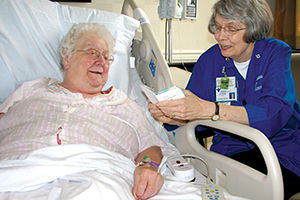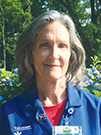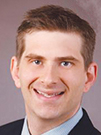By PAMELA SCHAEFFER
Georgeann Schmied is proud to be a volunteer for the Bon Secours Richmond Health System — a volunteer, that is, with a difference. As a highly trained member of Spiritual Care Partners, her role goes well beyond the many routine, though essential, services that volunteers typically provide. Schmied considers herself privileged to spend a few hours each week extending the reach of the system's 26 chaplains, all board-certified or eligible for certification, who serve the five-hospital system.
Formerly an employee in mission services and community outreach for the system, Schmied enjoys participating in the Bon Secours mission in this new way.

Spiritual Care Partner Jaci Cocks, right, visits with a patient at Bon Secours St. Mary's Hospital in Richmond, Va.
When she steps into a patient's room, after a gentle knock, she takes a deep breath, prays silently, "Lord be with me," and then just "lets it flow." She starts with small talk: What brought you into the hospital, she might ask, and do you have family in town? Then, as the conversation proceeds, she listens for a "care gate" — some subtle prompt suggesting that this particular patient is open to going a bit deeper, to sharing stories related to religious or spiritual beliefs, or to engage in a few minutes of mutual prayer.
By the numbers
Schmied, a Catholic, is one of about 30 active volunteers in the interfaith Spiritual Care Partners program. Rev. Peter Kim, director of pastoral care for the five-hospital Richmond, Va., system, introduced the program in 2013, not to replace chaplains, he said, but to ensure that a greater number of patients, including those with short hospital stays, have opportunities for spiritual conversation or prayer.
In a little over two years — from December 2013 to March 2016 — the spiritual care volunteers made 19,858 patient visits over 4,814 hours on 1,432 shifts, according to the Rev. Robert Shenk, program coordinator. Also during that period, the volunteers, trained to recognize when patients might want or need more than the volunteers' level of expertise, have made 1,019 referrals to the system's professional chaplains.

Schmied

Kim

Shenk
But the vision behind the program goes well beyond numbers. Thomas Butler, director of mission services for Bon Secours Richmond's parent, the Marriottsville, Md.- based Bon Secours Health System, noted that a major strength of the program is that it frees the professional chaplains to spend more time working with patients and families with critical needs. (Volunteers do not visit critically ill patients.)
"By no means is the program diminishing the role of the chaplains; it is maximizing and enhancing it," he said.
Further, Rev. Kim said, the professional chaplains value the opportunities to teach and supervise volunteers.
Each one, teach one
Equally important, he said, the reach of Spiritual Care Partners extends outside the hospitals' walls. The program nourishes the spiritual life and development of the lay volunteers who then share newfound knowledge and skills with their families, friends and religious congregations.
Rev. Kim, who holds a doctorate in pastoral theology and counseling from Brite Divinity School, Fort Worth, Texas, and Rev. Shenk developed a rigorous 80-hour training program consisting of classroom work and shadowing professional chaplains before visiting patients under the direct, and later indirect, supervision of professionals.
Classroom topics include the role of spirituality and narrative — sharing stories — in pastoral care; an overview of world religions; ministering in a context of diversity; understanding the dynamics of family systems; conducting pastoral conversations; assessing and addressing spiritual needs; the importance of self-understanding and practicing self-care.
Rev. Kim said the level of training the volunteers get rivals the education and formation provided to prospective chaplains in seminaries. Further, he said, the chaplains on staff recognize that the skills of the volunteers are often as good as their own. "They come with so much life experience — things you cannot teach. All they need is some training," he said.
High standards
Volunteers are either regular hospital volunteers who want to engage more deeply with patients, or increasingly, Rev. Shenk said, they are people outside the hospital who learn about the program through word of mouth.
Either way, applicants, like all volunteers at Bon Secours Richmond, are screened by the hospitals' volunteer service programs and then interviewed by Rev. Shenk. So far, 41 people have completed the training, he said. The majority are women over age 50.
Rev. Shenk said the volunteers never refer to themselves as "chaplains." Nevertheless, he said, patients do not always make the distinction, so he is careful to "hold the volunteers to a very high standard — to high professional standards," he said, "and they are required to adhere to a code of conduct that emphasizes confidentiality and openness to all religious beliefs." Proselytizing is prohibited.
"They are very straightforward," Rev. Shenk said of the volunteers. They will ask if it's okay to enter a room, introduce themselves and say, "I am a spiritual care partner, I work with the chaplains, and I'm here to see if you have any spiritual or emotional needs." Visits can range from under a minute to as long as 30 minutes, with the average being about five minutes, he said.
Intimate conversations
On several levels, the program has been a resounding success, Rev. Kim said — in large part, he said, that's owing to the support he receives from the system's senior mission leaders.
Rev. Kim's confidence was echoed by David Lichter, executive director of the National Association of Catholic Chaplains. Lichter said a collaborative initiated by Revs. Kim and Shenk, a group representing eight or nine different Catholic health systems, has been meeting in person and by phone over the past year or so to exchange information and best practices for utilizing pastoral care visitors. What Bon Secours brings to the table is the depth of services well-trained volunteers are able to provide, Lichter said.
For Rev. Kim, signs of success include a measurable increase in patient satisfaction scores since the program began. (Among other questions, patients surveyed are asked whether the staff had been attentive to their spiritual needs.) Rev. Shenk said he also sees success in the engagement of the volunteers. "If my volunteers are nourished and growing spiritually, I know the program is successful," he said. "So most of my energy is spent trying to be sure this continues to be a meaningful and worthwhile process for them."
Jaci Cocks, a Presbyterian who has been a spiritual care partner for about three years, said she had been deeply affected by her role — a sentiment she believes to be typical of the volunteers. "We go into a room expecting to serve, and very often come out realizing we have been served," she said. "I have been surprised at how quickly patients let us into their lives and the things they share. When we're in the patient's room we are so very aware of the Holy Spirit being there with us."
Copyright © 2016 by the Catholic Health Association of the United States
For reprint permission, contact Betty Crosby or call (314) 253-3477.